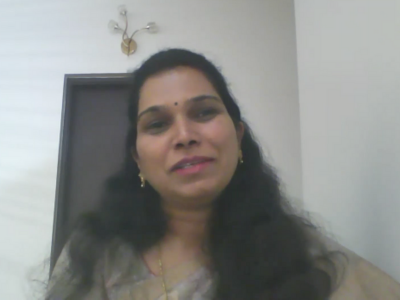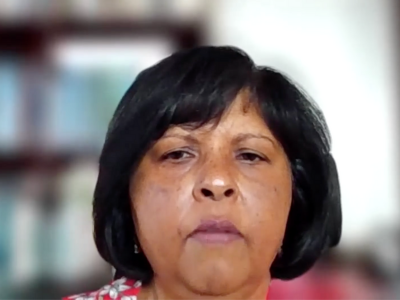
The webinar began with a warm welcome to the audience and an introduction to the guest speaker, Dr. Vijai Singh, who is the managing director of InnovatioCuris and chairman of the InnovatioCuris Foundation of Healthcare and Excellence.
Dr. Singh’s extensive experience as a surgeon and admiral from the Indian Navy, coupled with his degree in hospital administration and healthcare management, made him the perfect person to speak on the topic of international opportunities and safeguard for Indian nurses.

The host of the webinar, Professor Lavanya Nandan, who is the director principal at Nightingale Hospital and a member of the nursing forum at Uttar Pradesh Noida, then introduced the second speaker, Dr. Sharon, an education executive at Life Healthcare, South Africa. Dr. Sharon’s impressive background in nursing education, leadership, and quality assurance, along with her passion for people development and coaching, made her a valuable addition to the webinar.

Dr. Sharon was welcomed by the audience, which consisted of nursing educators, students, and young nurses interested in exploring opportunities overseas. She thanked everyone for their attendance and acknowledged the need to upgrade the standards of the nursing profession in India. Dr. Sharon mentioned that the government had recently sanctioned 157 nursing colleges in the budget to improve infrastructure and teaching quality. However, the profession was at a crossroad, with some private institutions performing well and others struggling to keep up.
Dr. Singh then took the floor and spoke about the current state of the nursing profession in India. He noted that the commitment of Florence Nightingale needed to be compensated and that the nursing profession was going to take the back seat, even in India. Dr. Singh emphasized the need for nurses, especially in high-risk jobs that require working day and night. He also discussed the importance of the nursing forum, a not-for-profit initiative launched a few months ago to benefit its members through training programs and a magazine that reaches 97,000 people.
Dr. Sharon and Dr. Singh then interacted with the audience and answered questions on a variety of topics related to nursing education, job opportunities, and the challenges faced by nurses in India.
Overall, the webinar provided valuable insights into the current state of the nursing profession in India and the opportunities available for nurses interested in exploring overseas opportunities. The expert speakers shared their knowledge and experience, and the audience engaged in a lively discussion, making the webinar a success.
Another critical factor to consider before working abroad is understanding the requirements of the country you plan to work in. Different countries have different requirements for foreign workers, and it’s essential to know what documents and certifications one need before a person can work in foreign lands legally. One need to ensure that the education and training meet the country’s standards and they have the necessary licenses and certifications.
Language proficiency is another crucial factor to consider before working abroad. Most countries have a national language that you need to be proficient in to work effectively. If you are not fluent in the language, you may need to take language courses to improve your proficiency. It’s also essential to consider the cultural differences and how they may affect your work and interactions with colleagues and patients.
Career progression is another factor that you should consider before working abroad. It’s essential to have a clear understanding of how your career will progress and whether there will be opportunities for growth and advancement in the country you plan to work in. You also need to consider the long-term impact of working abroad on your career when you eventually return home.
Discussing the move with your family is also essential before working abroad. It’s essential to consider how the move will affect your family and their quality of life. You need to discuss your plans with your family and ensure that they are supportive of your decision.
Working abroad can provide opportunities for international travel and work, but it’s essential to consider the big decision it entails. You need to prepare and complete a lot of forms and not get impatient during the process. Lastly, it’s essential to learn about visas and work permits before working in another country.
In conclusion, working abroad can be an exciting and rewarding experience, but it’s important to consider several factors before making the big decision. Understanding the requirements of the country you plan to work in, language proficiency, career progression, discussing the move with your family, and learning about visas and work permits are some of the factors to consider. It’s crucial to do your research and seek advice from those who have already made the move to ensure a successful transition to working abroad.
In addition to the requirements and processes outlined for nurses looking to practice in Canada, New Zealand, the United Kingdom, and the United States, there are some general tips that can help international nurses navigate the process more smoothly. Firstly, it’s important to start the process as early as possible to allow time for any delays or issues that may arise. You should also ensure that you have all necessary documents and paperwork in order, such as your passport, educational transcripts, and work experience certificates. It’s also a good idea to research the culture and healthcare system of the country you’re interested in working in to better understand the expectations and standards of nursing practice. Networking and connecting with other nurses who have gone through the registration process in the same country can also be helpful in providing advice and guidance.
Furthermore, it’s important for nurses to have a good understanding of the language used in the country they wish to work in. For example, in Canada and the United States, English is the primary language, while in Quebec and parts of New Brunswick, French is also widely spoken. In New Zealand, Maori is an official language, and many healthcare settings require a basic understanding of the language and culture. In the United Kingdom, English is the primary language, but there are also opportunities to work in Welsh-speaking areas.
Lastly, it’s important for nurses to be aware of the differences in nursing practice and healthcare systems between their home country and the country they wish to work in. Each country has its own unique approach to healthcare, and nurses should be prepared to adapt to new ways of working and caring for patients. This may involve learning new procedures and protocols, working with different types of equipment, and understanding the cultural expectations of patients and colleagues.
Dr. Sharon, discussed the benefits of working abroad as a nurse, including the opportunity to study and practice nursing in a foreign country, and the support provided by many companies for foreign nurses. Dr. Sharon emphasizes the importance of settling down before bringing family members and highlights that international nurses are often treated well by employers, sometimes even provided accommodation. She encourages pursuing further studies and having original documents ready.
In response to a question, Dr. Sharon notes that it is possible to get a job as a psychiatric nurse with the right qualifications and experience. She also mentions that taking the in clicks exam multiple times is possible, but requires a fee each time. When it comes to studying nursing abroad, specific requirements may vary depending on the country and institution, such as language proficiency exams and standardized tests like the GRE or TOEFL.
Dr. Sharon briefly mentions that Japan and Germany are countries that are open to nurses from Asian countries, such as India. However, she indicates that she does not know much about the future in South Korea, as the discussion in the video focuses more on the countries that participants are more interested in.
In conclusion, becoming a registered nurse in a foreign country can be a challenging but rewarding experience. It requires dedication, hard work, and a willingness to adapt to new environments and cultures. However, the opportunities for career advancement, personal growth, and cultural exchange make it an attractive option for many nurses looking to expand their horizons. By following the specific requirements and processes for the country they wish to work in, international nurses can achieve their goal of practicing nursing abroad and making a positive impact on the healthcare system and patients they serve.
Overall, the webinar provided valuable insights for nurses considering working abroad, including the benefits, preparation, and requirements. Dr. Sharon’s experience and advice can be helpful for those seeking to launch an international nursing career.
The webinar concluded with the announcement of an upcoming international conference, “Innovation in Health, No Health,” which would feature a panel discussion exclusively for nurses. Dr. Sharon promised to write for the forum’s magazine, and Dr. Singh expressed his gratitude to Dr. Sharon for her time and commitment to the nursing profession.

